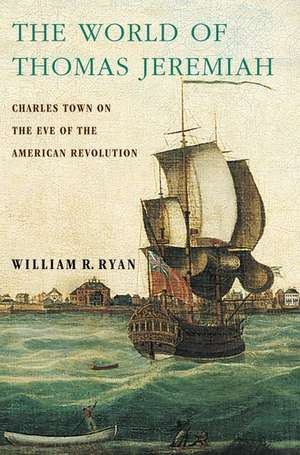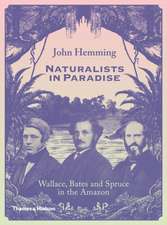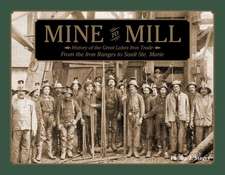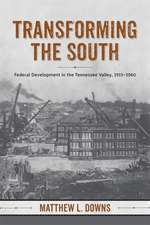The World of Thomas Jeremiah: Charles Town on the Eve of the American Revolution
Autor William R. Ryanen Limba Engleză Paperback – 12 iul 2012
| Toate formatele și edițiile | Preț | Express |
|---|---|---|
| Paperback (1) | 186.35 lei 31-37 zile | |
| Oxford University Press – 12 iul 2012 | 186.35 lei 31-37 zile | |
| Hardback (1) | 419.70 lei 31-37 zile | |
| Oxford University Press – 27 mai 2010 | 419.70 lei 31-37 zile |
Preț: 186.35 lei
Preț vechi: 215.26 lei
-13% Nou
Puncte Express: 280
Preț estimativ în valută:
35.66€ • 37.01$ • 29.81£
35.66€ • 37.01$ • 29.81£
Carte tipărită la comandă
Livrare economică 04-10 martie
Preluare comenzi: 021 569.72.76
Specificații
ISBN-13: 9780199922871
ISBN-10: 019992287X
Pagini: 282
Ilustrații: 8 b/w halftones, 1 b/w line
Dimensiuni: 231 x 155 x 18 mm
Greutate: 0.41 kg
Editura: Oxford University Press
Colecția OUP USA
Locul publicării:New York, United States
ISBN-10: 019992287X
Pagini: 282
Ilustrații: 8 b/w halftones, 1 b/w line
Dimensiuni: 231 x 155 x 18 mm
Greutate: 0.41 kg
Editura: Oxford University Press
Colecția OUP USA
Locul publicării:New York, United States
Recenzii
Ryan has created a work that gets to the heart of revolutionary movements. His study reveals the divisions and social stresses in the southern colonies, delves into the psychology of slaveholders in pre-revolutionary Charleston, highlights the dilemmas of the free and enslaved laborers in the Low Country of South Carolina, and determines the motivations of those who participated in the Revolution. As such, it will be of interest to sociologists, political scientists, cultural studies scholars, and historians alike.
There have been a number of books published about colonial and revolutionary South Carolina. However, not since Richard Walsh's Charleston's Sons of Liberty (1959) has a scholar so effectively dealt with the city's underclasses and their relationship with the colony's ruling elite. Ryan not only enters the world of Thomas Jeremiah effectively, but he convinces the reader that Jeremiah and his world had a tremendous impact on the wealthiest elite in colonial America.
This is an important, interesting, informative, well researched, and well-conceived book. It is concrete, using sources which bring the early years of the American Revolution in and near Charleston to life. It has several important strengths. It leaves the usual New England focus behind. It emphasizes the racial, class, and regional dimensions of the American Revolution in the Southeast, emphasizing the strength of Afro-Americans within the context of demography and their maritime skills, especially as pilots in treacherous and ever changing channels and harbor entrances.
Recommended.
The great strengths of this book lie in the provocative issues raised but left unresolved and in the reminder that the revolutionary era offered...new opportunities to challenge both the institution of chattel bondage and the allied structures of white supremacy.
There have been a number of books published about colonial and revolutionary South Carolina. However, not since Richard Walsh's Charleston's Sons of Liberty (1959) has a scholar so effectively dealt with the city's underclasses and their relationship with the colony's ruling elite. Ryan not only enters the world of Thomas Jeremiah effectively, but he convinces the reader that Jeremiah and his world had a tremendous impact on the wealthiest elite in colonial America.
This is an important, interesting, informative, well researched, and well-conceived book. It is concrete, using sources which bring the early years of the American Revolution in and near Charleston to life. It has several important strengths. It leaves the usual New England focus behind. It emphasizes the racial, class, and regional dimensions of the American Revolution in the Southeast, emphasizing the strength of Afro-Americans within the context of demography and their maritime skills, especially as pilots in treacherous and ever changing channels and harbor entrances.
Recommended.
The great strengths of this book lie in the provocative issues raised but left unresolved and in the reminder that the revolutionary era offered...new opportunities to challenge both the institution of chattel bondage and the allied structures of white supremacy.
Notă biografică
William R. Ryan has taught colonial American history at Duke University and North Carolina State University.















